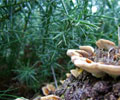How to Check Your Home for Mold Problems
Does your home have mold? The answer is probably. Should you worry about it? It depends. There are several thousand strains of mold in existence, and each of us encounter many of them in our daily lives. Most experts believe that except for those with asthma or other respiratory problems, these daily mold encounters are harmless. The problem arises with a particular mold called Stachybotrys.
Stachybotrys also goes by the name of “black mold” or “toxic mold.” This type of mold is thought to be responsible for a decrease in memory and worsened lung capacity in the very old and the very young, but may even cause health problems in healthy median-aged individuals as well. Besides health problems, black mold also causes damage to a home’s structure. For these reasons, it’s a good idea to be on the lookout for black mold in your home.
Because mold reproduces in moist places, be sensitive to signs of mold especially after you have had any water damage in your home. You may see mold growth dotted on the walls, ceilings or furniture. Also, check underneath surfaces and in dark places. Even if you aren’t able to see the mold, it could still be there behind walls or in the ceiling. If you become aware of a musty, dank smell or if mold-sensitive people start to complain while in your home, have your home inspected for black mold.
Hire a contractor to check the air quality in your home for evidence of mold. Although black mold is a health risk and a home safety risk, don’t expect your health or home insurance to foot the bill. If you own your home, you’ll be expected to cover the costs of mold inspection and cleanup on your own. If you rent, you’ll most likely be able to get your property owner to take care of the problem for you.
It is possible to remove mold from your home by yourself, but if you don’t have several days to devote to the process, hire a professional to do it for you. Expect to have to evacuate your home for a period of time so that you won’t be exposed to the cleaning chemicals and disrupted mold spores. If you’re removing the mold yourself, invest in a good respirator to keep you safe during the cleaning.
Even if you don’t suspect mold in your home, have it inspected before you put your home up for sale. If mold is discovered during the buyer’s inspection, the deal will probably fall through and you’ll be delayed in selling your home or have to settle for far less than your home would be valued at otherwise. If your home is sold and mold is discovered shortly afterwards, you could still be responsible for the cleanup.
Early detection of black mold in your home can drastically reduce the time, effort and cost associated with mold cleanup. Have your home inspected for mold as soon as you suspect you might have it growing in your home.
